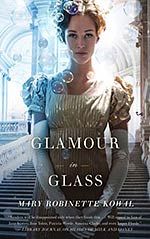
![]() MMOGC
MMOGC
8/6/2013
![]()
I think 2013 has seen me branching out into more sub-genres of fantasy than any other year, thanks to participating in events like the Worlds Without End's Women of Genre Fiction Reading Challenge. Once, Mary Robinette Kowal fell into the category of "An author I've never read before, but would really like to" and so the book I chose for the challenge was 2012 Nebula Award nominated Glamour in Glass.
Someone once told me that when writing a review, it helps to think about what makes a book different and why readers should care. For this one, the thing that struck me right away was the setting. But while I may have read fantasy fiction aplenty that takes place in this time period, this is the first time I've actually ventured into something with strong elements of Regency romance, complete with the stylistic conventions that bring to mind the works of Jane Austen. This is also the first time I've ever heard the term "Fantasy of manners". Hooray for discovering new things!
It wasn't until after I picked up Glamour in Glass that I discovered it was actually the second book of a sequence called the Glamourist Histories.Normally, I dislike reading books in a series out of order, more out of a fear that I'd get lost than anything. That's why I was happy to learn that you don't have to read the first book Shades of Milk and Honey to follow the story and understand what's going on. The magic system in this book, called Glamour weaving and described with textile-related metaphors, was sufficiently explained and the general idea of it is easy to pick up. I also quickly got that our main characters, Jane and Vincent, were newly married since the last book, and now they're looking forward to settling down to a life of nuptial bliss and doing Glamour together.
However, at the start of this book is also the period following the abdication of Napoleon. While Jane and Vincent are on their honeymoon in Belgium, the deposed emperor escapes exile and makes his return to France, leaving the newlyweds with no easy way to return to England.
Certainly, this book was somewhat of a departure from the kind of fantasy I usually read and the experience was very new and different for me. The language and characters' mannerisms are definitely in keeping with the time period, which I have to admit was delightful and yet frustrating at the same time. Mostly, the frustrations come from the narrator Jane and the way she dwells on issues for a long time and perceives every little indignity as a personal slight to her, especially those pertaining to marriage and her husband.
I find this still bothers me even when taking into account the era in which these books take place, a time when men and women's statuses vastly differ, so I'm not holding that against Jane. Instead, my dissatisfaction of her character stems from from her relationship with Vincent and how often their marriage feels "off". First of all, a big chunk of the novel's conflict is the result of a breakdown of communication between the two of them. I've seen this trope commonly used in romances, but I'm personally not a fan of it.
Also, despite being madly in love, the two of them don't seem to know each other very well. Awkwardly, Jane is still constantly discovering new things about her husband that surprises her or makes her doubt him, and I also found myself questioning why she so often feels the need to seek permission or approval from him for every little decision. I have to assume their courtship mustn't have lasted very long, but perhaps this is where I need to pick up Shades of Milk and Honey to find out.
Speaking of the first book, I do intend to go back and read it. Despite my problems with the main character, I thought this book was well-written and contains interesting ideas. I can't really talk about some of the issues in it without giving away too many spoilers, but suffice to say the emotional reactions of the characters are very well-described, deep, and most importantly, realistic and believable. I also love the idea of Glamour magic, which is just abstract enough to give one the sense that it's so much more than can be put into words. I'm looking forward to learning more details about Glamour in the first book, as well as in future installments of this series.
http://bibliosanctum.blogspot.com